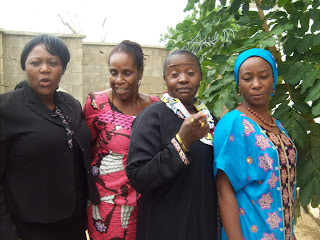After a couple of stops our driver dropped up off at the pits. We would have to find a taxi or tuk-tuk (canopia) to get back to the house at Sa’adatu Rimi College of Education because the driver who had picked us up 2 hours late, had another engagement.
A man who introduced himself as Hadim greeted us outside the gate to the Kofar Mata Dye pits. He recognized Pam from her previous visit and chatted with her briefly. He explained to us that the pits were set up in the late 1400s and were among the oldest in Africa.
 I was a bit disappointed when we walked through the archway and onto a multilayered area of concrete like platforms dotted with pits ranging from three to about eight feet in depth. Only about four of the 30 or so pits appeared to be in use. Most were filled will trash—discarded water sachets, paper, twigs and the place didn’t generally look as if it had been given the respect of care earned by its historical significance. We were introduce to one dyer who had worked in the trade for almost 50 years as the involved process of making the indigo dye and coloring fabric was explained. A few yards away was the ‘ironing room’. As we approached a rhythmic whomp, whomp, whomp could be heard above the roar of traffic outside the gate. Four men knelt on either side of 2 logs that were about 2 feet in diameter. In ancient traditional fashion, they alternately pounded pieces of fabric to ‘iron’ or flatten them after they had been dyed and dried.
I was a bit disappointed when we walked through the archway and onto a multilayered area of concrete like platforms dotted with pits ranging from three to about eight feet in depth. Only about four of the 30 or so pits appeared to be in use. Most were filled will trash—discarded water sachets, paper, twigs and the place didn’t generally look as if it had been given the respect of care earned by its historical significance. We were introduce to one dyer who had worked in the trade for almost 50 years as the involved process of making the indigo dye and coloring fabric was explained. A few yards away was the ‘ironing room’. As we approached a rhythmic whomp, whomp, whomp could be heard above the roar of traffic outside the gate. Four men knelt on either side of 2 logs that were about 2 feet in diameter. In ancient traditional fashion, they alternately pounded pieces of fabric to ‘iron’ or flatten them after they had been dyed and dried.Then on to the finished products: we were surrounded by vendors showing off fabric of different sizes and shapes who explained the significance of each design—bride and groom, rising moon and sultans guards, among others. Pam and I bought squares of the bold blue fabric. Barb decided the products looked too much like 70s tye-dye to invest in. Oh well, so much for historical significance.








































